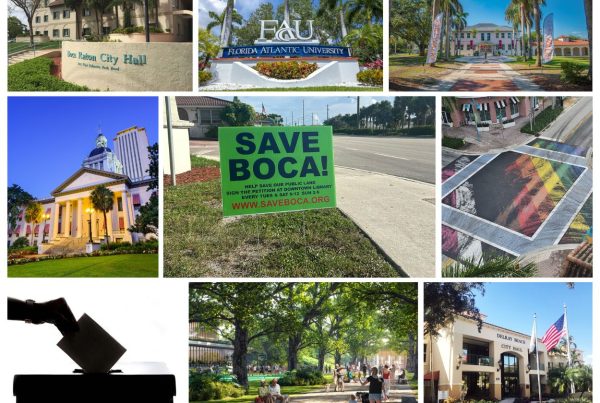The great street festival debate
The Delray Beach City Commission’s seven-hour meeting Tuesday night/Wednesday morning ended with the commission close to collective agreement. That period of calm, however, was deceptive. Such sentiment did not match the tone of earlier discussions.
The topic was street festivals. The commission had been scheduled to hear Garlic Fest’s appeal for a date next February. That appeal had been likely to fail, and festival organizers withdrew it. The city’s denial stands. There will be no Garlic Fest in 2017 unless the organizers find an acceptable date or a location away from downtown.
Delray’s social media babble on this issue clearly frustrated the commissioners, who some residents had accused of wanting to run off Garlic Fest in particular and to drive all festivals out of downtown, meaning Old School Square and the surrounding area. Mitch Katz complained of hearing that there wouldn’t be a St. Patrick’s Day parade next March, though there will be. Delray Beach considers it and others “hometown” events and outside of the new policy designed to control festivals that draw outsiders.
Mayor Cary Glickstein had told me before the vote that because Delray previously had tried to lure many events, the city created a “free for all. So it’s not surprising that (the new policy) is difficult.”
Echoing his colleagues, Glickstein said, “We don’t want to start chasing people away.” But the mayor and commissioners are “stewards of public land.” The downtown event season is “compressed within a six-month period in a small space. The city doesn’t have an opportunity to breathe.”
At the meeting, Glickstein agreed with City Manager Don Cooper’s characterization of Old School Square as “a fairgrounds” when events are coming and going. “I don’t want to see a fence around (Old School Square) again.”
Few issues better embody the changes in Delray Beach over the last two decades. The city once was desperate to attract people, and the events did that. Now, people seek out Delray Beach. Development of Old School Square did much to remake Delray Beach, and the commission wants to focus on enhancing that asset. Glickstein speculated that Old School Square’s endowment is so low because the city hasn’t treated it properly.
In August, Cooper said, the commission would vote to codify the special events policy in an ordinance. To one comment that the commission thus finally would be done with the issue, Cooper said, “I don’t know that we’ll be done with this” even then.
And the rest of the meeting: City Attorney
Discussion of Delray Beach’s legal department might have been routine. The commission needed to offer suggestions on the proposal for firms and individuals seeking to become city attorney and to approve a deal for Noel Pfeffer to return in that role. The first item went fairly smoothly. The second one didn’t. Anything but.
City Manager Cooper had proposed that the city spend $20,000 per month to hire Pfeffer—who resigned effective June 24 to take a job with the Fort Lauderdale firm of Conrad & Scherer—for four months, from July 13 to Nov. 13. Cooper chose that period because the deadline for city attorney applicants is Sept. 9, and Cooper estimates that it will take “35 to 40 days” to make the hire, whether it is an individual or a firm.
Meanwhile, the five-lawyer office is down to three lawyers. Interim City Attorney Janice Rustin acknowledged that she “had no idea of the volume of work” the office handles. Major issues include the Atlantic Crossing lawsuit, the iPic parking agreement, the Arts Garage and Old School Square leases and planning and zoning issues.
The Arts Garage and Old School issues have looming deadlines. Then there’s what Rustin called the “day-to-day flow” of routine issues, many of which involve other departments. Without Pfeffer and his institutional knowledge, Cooper said, the office’s work “could slow down even more.”
The commission probably would have passed, 3-2, with Mitch Katz and Shelly Petrolia opposed. They were Pfeffer critics. Before the commission could vote, however, Katz questioned whether Jordana Jarjura could vote at all. She had worked previously for Conrad & Scherer. Did Jarjura, Katz wondered, retain a financial interest in the firm? Would her vote to hire Pfeffer amount to gain for the firm, and thus to her?
Katz intimated that Jarjura’s association with Conrad & Scherer was a revelation. Jarjura responded that her bio on the city’s website contained the information. She explained that she had no business relationship with her former firm. A Conrad & Scherer partner is president of Gulf Building, where Jarjura is chief counsel. The firm and the company, which is a Conrad & Scherer client, are in the same building. The company president owns a one percent share of the law firm.
The question then became whether Jarjura should recuse herself from voting on the Pfeffer contract. Jarjura chose not to vote, but not because she agreed with Katz or his tactic. If she did vote, Jarjura said, “My colleague to my left (Katz) would file an ethics complaint.”
Katz said he received an anonymous letter about Jarjura over the weekend that contained “some interesting facts.” To anyone watching, Katz ambushed Jarjura. But Katz said Wednesday, “I think I did her a favor. If she had voted, it would have been an ethics violation.” That seems like a big stretch, since there would have been no gain to Jarjura. “I’m surprised she didn’t send me some flowers.”
That’s unlikely. Jarjura told me Wednesday that she would fill out a conflict form and would read a statement at the next meeting.
Oh, and the legal department? The real issue? The commission took no vote on the Pfeffer proposal and likely never will. In an email Wednesday, Glickstein said, “Had I known a commissioner was going to blindside another commissioner with an attack on her integrity I would have sought to remove it from the agenda to avoid more amateur-hour tactics regarding the city attorney’s position. It’s unfortunate to see petty, personal vendettas take precedence over getting important work done.”
The new option seems to be Steven Rubin, a Boca Raton attorney who already is doing work for the city. Because of that association, Glickstein said, Rustin could hire him “as needed within the budget.” Rubin declined to comment when I spoke with him on Wednesday. What happened at the meeting likely will make it even harder for Delray Beach to hire a good permanent city attorney.
And the rest of the meeting: Fire-rescue
After the blowup over the city attorney, the commission at least did approve a new fire-rescue contract between Delray Beach and Highland Beach. Jarjura and Katz even voted on the same side, with Glickstein.
Petrolia was the dissenter. She challenged the numbers put forth by City Manager Don Cooper and Fire Chief Neal de Jesus. Petrolia acknowledged Wednesday that she relied on calculations by commission gadfly Ken MacNamee, who had registered his disapproval with the contract in long emails to commissioners. Cooper declined to comment on MacNamee’s figures.
Petrolia said she raised other issues after reviewing the contract. To me, though, de Jesus and Assistant Chief Financial Officer Jeff Snyder offered credible answers to Petrolia’s questions about finances and other matters. At one point, Petrolia discussed liability concerns and mentioned Freddie Gray, whose death in Baltimore last year led to riots. De Jesus responded that Gray had died in a police paddy wagon, not an ambulance.
The Highland Beach Town Commission had approved the contract, pending Delray Beach’s approval. Fortunately, Katz voted in favor despite what he said were some misgiving about the wording. If Katz had voted no, the contract would have failed, 2-2. Once again, Al, Jacquet wasn’t around for a big vote. He left the meeting early.
And the Boca El Rio Park
A city spokeswoman said Boca Raton has received several proposals for Phase 2 of Hillsboro/El Rio Park, on Southwest 18th Street next to the Florida East Coast Railway tracks.
Phase 1—two athletic fields—was completed 14 years ago. The city delayed Phase 2, and the Great Recession delayed it even more. Last year, the city council approved a more limited plan than the original, focused on making the Hillsboro-El Rio Canal more accessible to kayakers and paddleboarders. It’s part of the citywide plan to open up the public waterfront.
Once staff members choose a proposal, the issue will go to the council, probably in August.








